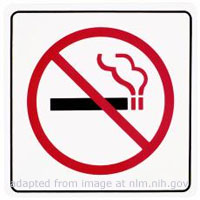Puff, puff, pass a smoking ban

(Moscow News – themoscownews.com – Kristen Blyth – February 18, 2013)
Making a smoking section at a restaurant, as comedian George Carlin once put it, is like designating a urinating section in a swimming pool. The two are not separate, whether you like it or not.
In Russia, a country where about 39 percent of people are regular smokers, coming home smelling like an ashtray has long been an accepted part of social life – but not for much longer.
An anti-tobacco law which strictly limits cigarette sales, advertising and public smoking overwhelmingly passed a final reading in the State Duma last week, with 441 deputies voting for the bill and one against. It will be reviewed by the Federation Council on February 20th before going to President Putin to be signed into law.
If approved, a broad number of new tobacco restrictions will take effect over the next year and a half. Beginning June 1st, 2013, there will be a ban on smoking in public areas – including government buildings, schools, universities, hospitals, sports stadiums, beaches, parks and playgrounds – plus bans on cigarette advertisements, on distribution of free samples or coupons for tobacco products and on tobacco corporate sponsorship of events.
Smoking will be prohibited within 15 meters of metro, airport and train station entrances. It will be allowed at entrances to residential buildings, but only with the written consent of every building resident.
Designated rooms for smoking will still be allowed at private businesses and office buildings.
Sales of tobacco products will be banned at any location with a floor area smaller than 50 square meters, and sales of electronic cigarettes will be prohibited completely.
Beginning June 1st, 2014, a ban on smoking in restaurants, bars, hotels, long-distance trains, ships and at all types of transport stops will also take effect.
Less smoking, more civilization
The bill is the culmination of an anti-smoking campaign personally sponsored by Prime Minister Dmitry Medvedev. In a video blog posted online last October, Medvedev drew public attention to the high number of tobacco-related deaths in Russia: about 400,000 each year, which causes an annual loss of 1.5 trillion rubles ($48.36 billion) in medical costs and lost productivity, according to health studies.
Gennady Onishchenko, Russia’s Chief Sanitary Inspector, expressed satisfaction with Medvedev’s initiative. “I would like to congratulate our country on passing [this law], making Russia a civilized country,” he said after the bill was approved. The Ministry of Health hopes the new restrictions will lower the number of smokers from 39 to 25 percent by 2020, as well as help encourage general health awareness.
The public response has been a mixture of approval by those who applaud the government’s effort to improve public health, and outrage by those who believe the law infringes on personal freedom.
Small business threatened
Actual effects of the anti-tobacco legislation remain to be seen.
The majority of Russians are not convinced that smoking will become less popular. A poll conducted by the Public Opinion Foundation (FOM) in January 2013 found that 51% of Russians believe the general number of smokers will not decrease at all, and 27% think it will fall only slightly.
Restaurants and bars also seem unlikely to experience any revenue loss as a result of becoming smoke-free. “People won’t stop going out for love of a cigarette,” said Don Craig, an event organizer who works with restaurants such as Casa Agave and Papa’s Place. “Most businesses I know don’t even like the hassle of selling cigarettes, so the overall effect on sales according to tobacco revenue would be minimal.”
“I think it may actually create a sales boost due to increased food sales, especially bar snacks and appetizers,” he added.
It does appear certain, though, that the anti-tobacco law will have a crippling effect on small businesses and kiosks whose survival relies mainly on cigarette sales.
“Most of our money comes from cigarettes,” said Artyom, an employee at a small underpass kiosk near the Park Kultury metro station. “We’ll keep working until the law starts, but then we will definitely close. We can’t stay open without money from cigarettes.”
The Ministry of Economic Development estimates that adoption of the law could lead to the closure of about 175,000 retail properties, leaving about 500,000 people unemployed.
Enforcement problematic
How the law will be implemented – and whether or not it will be possible to realistically enforce it – is another major concern. The Duma is currently considering a bill that would levy a fine of 1,000 to 1,500 rubles for smoking in public.
“One of the internal problems will be controlling not only the customers [in bars and restaurants], but also the staff and security, because 90% of them do smoke,” said Craig, the event organizer. “It will need to be discussed to find a proper solution.”
Smoking and drinking are typically considered hallmarks of Russian social life. Though drinking in public areas outdoors was also banned recently, it’s still common to see Muscovites swigging beers on the street in full view of indifferent police officers.
As the old saying goes, “the harshness of Russian laws is compensated by the laxness in their enforcement.” The anti-tobacco bill, it seems, will not prove an exception to the rule.
